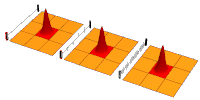Zeno effect

The Zeno effect is like trying to catch a ball that you keep throwing in the air before it can get very far away from you. Basically, the more you check on something, the less it can move or change.
Now, in the world of science, this concept is applied to subatomic particles, which are teeny-tiny things that make up everything around us. When you try to observe these particles, you can actually stop them from moving and changing (just like how you can stop the ball from moving by constantly catching it).
This is because subatomic particles behave differently when they're being watched. It's like they know they're being watched and try to stay in the same state to avoid being detected.
So, the Zeno effect is really just a way of describing how observing or measuring a particle can affect the way it behaves. And this concept is important in understanding the strange properties of these tiny, building-block particles.
Now, in the world of science, this concept is applied to subatomic particles, which are teeny-tiny things that make up everything around us. When you try to observe these particles, you can actually stop them from moving and changing (just like how you can stop the ball from moving by constantly catching it).
This is because subatomic particles behave differently when they're being watched. It's like they know they're being watched and try to stay in the same state to avoid being detected.
So, the Zeno effect is really just a way of describing how observing or measuring a particle can affect the way it behaves. And this concept is important in understanding the strange properties of these tiny, building-block particles.
Related topics others have asked about:
